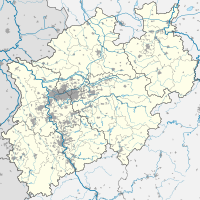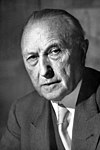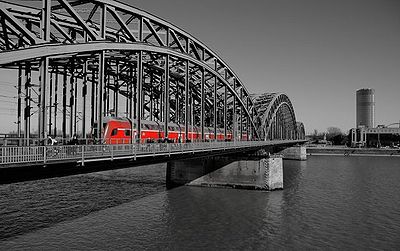Wikipedia:WikiProject Germany/Portal:North Rhine-Westphalia
|
NRW Portal
Portals → Geography → Europe → Germany → North Rhine-Westphalia → nrw.de
Selected1 panoramaIntroduction
 North Rhine-Westphalia (German: Nordrhein-Westfalen [ˈnɔɐ̯tʁaɪn vɛstˈfaːlən] , usually shortened to NRW, official short form NW) is the westernmost, most populous, and economically most powerful state of Germany. The state was formed in 1946, by merger of two rather distinct territories of the historic Free State of Prussia: the Rhine Province and the Province of Westphalia. The former Free State of Lippe was joined in 1947. North Rhine-Westphalia is situated "deep in the West" of Germany and includes the plains of the Lower Rhine region and parts of the Central Uplands (Mittelgebirge) up to the gorge of Porta Westfalica. The state comprises a land area of 34,083 km² (13,158 square miles) and shares borders with Belgium in the southwest and the Netherlands in the west and northwest. It has borders with the German states of Lower Saxony to the north and northeast, Rhineland-Palatinate to the south and Hesse to the southeast. North Rhine Westphalia has a population of approximately 18 million inhabitants, and is centred around the polycentric Rhine-Ruhr metropolitan region, which includes the formerly industrial Ruhr region and the Rhenish cities of Bonn, Cologne (Köln) and Düsseldorf. 30 of the 80 largest cities in Germany are located within North Rhine-Westphalia. The state's capital is Düsseldorf, the state's largest city is Cologne. As the most urbanised federal state in Germany, North Rhine-Westphalia possesses the country's highest density of cultural, educational and research institutions, the densest transport infrastructure and the highest number of multinational corporations. North Rhine-Westphalia contributes about 22% to Germany's gross domestic product and accounts for about 28% of the country's foreign direct investments.[1] TopicsSelected article
The University of Bonn (German: Rheinische Friedrich-Wilhelms-Universität Bonn) is a public research university located in Bonn, Germany. Founded in 1818 the University of Bonn is today one of the leading universities in Germany.
Selected biography
Konrad Hermann Joseph Adenauer (5 January 1876, Cologne – 19 April 1967) was a German statesman.
Although his political career spanned sixty years, beginning as early as 1906, he is most noted for his role as the first Chancellor of the Federal Republic of Germany (then known as West Germany) from 1949–1963 and chairman of the Christian Democratic Union from 1950 to 1966. Related portalsSelected imageSubcategoriesAssociated WikimediaThe following Wikimedia Foundation sister projects provide more on this subject:
|
Berlin | Brandenburg | Hamburg | Mecklenburg-Vorpommern | North Rhine-Westphalia | Schleswig-Holstein
- ^ data by NRW.INVEST














